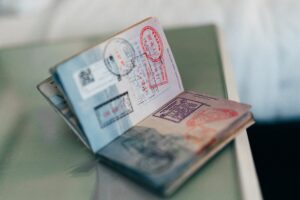Going to the UK to study further and acquire higher education requires a visa. Every student planning to study abroad needs to apply for a visa after passing the selection process. There are a number of visas one can apply for. A dependent visa is one of them. Through this blog, we’ll take you through the details of what a dependent visa UK is, how you can acquire one and what is the process you’ll have to go through.
Dependent Visa UK
With several options available while applying for a visa, one can get confused about which one is the most suitable. The Dependent Visa or PBS Dependent Visa enables the dependents of any person who is a permanent resident or UK citizen to join them in the UK. This type of visa is typically applied to by family members and children. A family member of any individual working or residing, or studying in the UK can apply for a dependent visa. A dependent visa holder enjoys the same benefits as that of their sponsor’s visa, and the duration of your visa will be the same as that of your sponsor’s.
Types of Dependent Visas in the UK
Dependent visas in the UK are of various types depending on the visa of your sponsor. They are listed below:
- Tier 1 Dependant visa
- Tier 2 Dependent Visa
- Tier 4 Dependent Visa
- Tier 5 Dependent Visa
- Appendix W Dependent Visa
Dependent Visa and Student Visa
A student holding a student visa in the UK can also bring dependents on their student visa. The dependent can apply for a point-based system (PBS) dependent visa to join the sponsor in the UK. The conditions to be met by the dependent are the same as the general conditions. However, there is are a few additional conditions that the sponsors must qualify to bring a dependent with them. The conditions are:
- The sponsor is going to the UK for a postgraduate course that is more than 9 months long.
- In case of a course below postgraduate level, the sponsor must have official financial sponsorship from the government, and the course must be at least 6 months long.
Eligibility Criteria for a Dependent Visa in the UK
The UK Visas and Immigration (UKVI) services lay down very specific rules for people applying for a visa. The person upon whom the application is based is known as the sponsor. The sponsor needs to be a visa holder in the UK or a permanent resident. A person who wishes to apply for a dependent visa needs to be related to the sponsor in one of the following ways:
- The applicant is a spouse or a civil partner of the sponsor.
- The applicant is an unmarried child with an age of fewer than 18 years.
- The applicant is an unmarried or same-sex partner of the sponsor.
For a person to be a sponsor to someone’s dependent visa, they must be:
- A resident in the UK with a valid visa
- Applying for a visa at the same time as that of the dependent
Documents Required
For a spouse or civil partner
The following documents have to be provided to the UK Visas and Immigration services if the applicant is applying for a dependent visa in the spouse or civil partner category:
- A Marriage certificate or Civil Partnership Certificate
- Bank Statements or Housing Society Statements
- Tax Bills
- Medical Registration Documents
- Utility Bills
- Sponsor’s CAS Number
- Valid passport
For children less than 18 years of age
- A birth certificate that has details of both parents.
- Valid passport
For children more than 18 years of age
- Bank statements
- Credit card bills, if any
- Valid driving license
- National Health Service (NHS) registration document
- Letter from current school/college/university for address proof
Dependent Visa Applicants- Special Conditions
For a same-sex or unmarried partner of the sponsor
A same-sex or unmarried partner of the sponsor must provide proof of a genuine and subsisting relationship with the sponsor for at least two years, as well as intent to live together permanently. To prove this relationship, they need to provide the following documents:
- Evidence proving that you live together. This can be shown by presenting a tenancy agreement or utility bills.
- Bank accounts that show shared finances between the dependent and sponsor.
- Proof that the dependent and sponsor have visited each other’s families.
- Letters, emails, or phone records that show the dependent and sponsor maintained contact when apart.
For children
Children of the sponsor need to meet one of the following conditions to qualify for a dependent visa:
- Both parents of the dependent are applying for entry clearance at the same time.
- Both parents of the dependent are already residing in the UK, and the dependent is applying to join them.
- One parent is already residing in the UK, and the other parent is applying for entry clearance at the same time as that of the dependent.
For children with a sole parent
A major condition for dependent visas for children in the UK is that they must have their parents in the UK with them. However, this condition is not taken into consideration under special circumstances. Thus, children with a sole parent can qualify for a dependent visa only if the following conditions are met:
- The parent is the only surviving parent of the dependent.
- The parent has sole responsibility for the dependent’s upbringing.
- There are serious or compelling reasons as to why the dependent can apply as the dependant of only one of their parents.
Monetary Conditions for Applicants and Sponsor
For any sponsor to bring in a dependent on their visa, they must prove they can sustain their dependent’s expenses upon arrival. This is a crucial part of the visa application. The applicant and dependent must have the following amount of money in their bank accounts for at least 28 days before the date of applying for the visa:
- £845 per month for up to 9 months for courses in London
- £680 per month for up to 9 months for courses outside London
Application Process for a Dependent Visa
For applicants applying outside the UK, they can follow the below-mentioned steps:
- You can either apply online as the sponsor’s dependent partner or the sponsor’s dependent child.
- Once the online application is submitted, you will need your application number. This number is called a Global Web Form (GWF) as well as a Unique Application Number (UAN). It can be found in the letters or emails you’ll receive from the Home Office after applying.
- The next step is to get a biometric residence permit (BRP). This can be obtained by providing your fingerprints and photograph at a visa application centre.
- The BRP needs to be collected within 30 days before arriving in the UK.
- Once successfully issued, the expiry of your visa will be the same as that of your sponsor.
Processing Time for the Dependant visa
The processing time for a dependent visa in the UK differs according to different situations. The situations and the processing times are mentioned below:
- Applying from outside the UK: 12 weeks processing time from the date of visa appointment.
- Applying from inside the UK: 8 weeks processing time from the date of visa appointment.
- Priority service: After paying an additional fee, the application can be processed within 5 working days.
- Super priority services: After payment of an additional fee, the application could be processed quickly, and a decision could be received within 24 hours from the time of application.
Conclusion
Getting a dependent visa can be a good choice for you if you’re underage or have someone who already has a visa for the UK. Being a dependent, you will be able to study and work in the UK. On top of that, before the expiry of your visa, you can also apply for indefinite leave to remain on your next visa. Acquiring a visa is a tricky process. A lot of details and documents are involved, and the process is highly intricate. To make sure you get it right the first time, you can refer to the Leap Scholar blog library to get a hold of the required resources and for further information about the various visas you can apply for. Make an informed decision and apply for your visa today with our help!
Frequently Asked Questions
1. What is the difference between a UK family visa and a UK dependent visa?
The difference between a family visa and a dependent visa in the UK is that a UK family visa can be granted to any family member of a British citizen. Whereas a UK dependent visa is granted to an immigrant holding a temporary work visa or student visa in the UK.
2. Are dependent visa holders allowed to work in the United Kingdom?
Yes, dependent visa holders can work in the UK, but there are some restrictions in place. A dependent visa holder cannot work as a professional sportsperson or a dentist or doctor in training. They can, however, work in a self-employed capacity.
3. Can I extend or switch my visa before my visa expires? What will be the charges?
Yes, you can choose to extend your dependent visa as well as switch to a different visa before your current visa expires. The charges for extending your dependent visa are £475 for the visa, the healthcare surcharge, which is variable, and you may need to pay £19.20 for your biometric information update.







